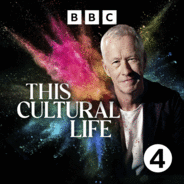Award-winning television dramatist and director Sally Wainwright talks to John Wilson about her formative cultural influences. After learning the art of screenwriting whilst working on Coronation Street, she made her name with her suburban comedy drama At Home With The Braithwaites. Her stories are usually set in the north of England including Last Tango in Halifax, and her 19th century historical series Gentleman Jack. Her most recent hit is Happy Valley, a crime drama that spanned a decade and three series, winning huge acclaim, viewing figures and multiple awards. Sally talks about her early obsession with television, and how the 1970s musical drama Rock Follies inspired her to become a television writer at a young age. She recalls her early career writing for BBC Radio 4's The Archers and the ITV soap Coronation Street and discusses the inspirations behind some of her biggest hits.Producer: Edwina Pitman

Kultur & Gesellschaft
This Cultural Life Folgen
In-depth conversations with some of the world's leading artists and creatives across theatre, visual arts, music, dance, film and more. Hosted by John Wilson.
Folgen von This Cultural Life
144 Folgen
-
Folge vom 22.04.2023Sally Wainwright
-
Folge vom 15.04.2023Linton Kwesi JohnsonReggae poet Linton Kwesi Johnson reveals the influences and experiences that inspired his own creativity. Born in Jamaica, he moved to south London in 1963 at the age of eleven. He made his name as a performance poet, reciting politically motivated verse to a dub-reggae backbeat, and becoming a powerful voice of resistance and protest in response to racism on the streets of Britain in the 1970s. He became the first black poet to be published in the Penguin Modern Classics series, was awarded the PEN Pinter Prize in 2020, and recently published a collection of prose under the title Time Come. On stage and on record, he is renowned for angry and uncompromising works such as Five Nights Of Bleeding, Sonny’s Lettah, and Iglan Is a Bitch.For This Cultural Life, Linton Kwesi Johnson recalls growing up in poverty in rural Jamaica, where his grandmother told him ghost stories and read The Bible. Appalled at the racism he experienced, he joined the Black Panthers whilst still at school and became a political activist. He began to write and perform poetry, set to music and delivered in Jamaican patois, after being inspired by reggae artists such as Prince Buster and U-Roy, and the American group The Last Poets. Johnson also talks about the tragic fire that killed 13 young partygoers in New Cross, south London in 1981, an event that he commemorated in one of his best known works, New Craas Massahkah. Producer: Edwina Pitman
-
Folge vom 08.04.2023Martin ParrJohn Wilson talks to photographer Martin Parr about the formative influences and experiences that inspired his own creativity. Globally renowned for his witty and satirical scenes of British life, Parr made his name in the 1970s with a series of monochrome photographs documenting the community of Hebden Bridge, West Yorkshire. His fame grew with his 1985 project The Last Resort, which captured the spirit of the great British holiday in images of ice-cream, chips, and sunburnt bodies on the litter-strewn concrete promenade of New Brighton, Liverpool. Since then, his instantly recognisable work has examined subjects including global consumerism, mass tourism and class. He has published over a hundred books of his work, exhibited all round the world, and is regarded as one of Britain’s greatest photographers. Parr is celebrated as Master Of Photography at the 2023 Photo London fair, and has recently opened his own Foundation to exhibit the work of emerging photographers alongside his own. Martin Parr reveals how, growing up in suburban Surrey, he was introduced to photography by his Yorkshire grandfather during holiday visits. He remembers seeing exhibitions by Bill Brandt and Henri Cartier-Bresson in the late 1960s, but it was the work of British street photographer Tony Ray-Jones, whose images he first saw whilst studying photography at Manchester Polytechnic, that was most influential. Martin Parr further developed his distinctive documentary style, and his use of saturated colour processing techniques, after seeing work by American photographer William Egglestone. Martin Parr also chooses the 1991 film Night On Earth by Jim Jarmusch as a key influence on his quirky approach to storytelling, and reflects on how his style and subjects have developed over the years.Producer: Edwina Pitman
-
Folge vom 01.04.2023Margaret AtwoodMargaret Atwood talks to John Wilson about the formative influences and experiences that shaped her writing. One of the world’s bestselling and critically acclaimed authors, Atwood has published over 60 books including novels, short stories, children’s fiction, non-fiction and poetry. She’s known for stories of human struggle against oppression and brutality, most famously her 1985 novel The Handmaid’s Tale, a dystopian vision of America in which women are enslaved. She has twice won the Booker Prize For Fiction, in 2000 for The Blind Assassin and again in 2019 for her sequel to The Handmaid’s Tale, The Testaments. Growing up in remote Canadian woodland with her scientist parents, she traces her career as a story-teller back to sagas that she invented with her older brother as a child, and her first ‘novel’ written when she was seven. She recalls an opera about fabrics that she wrote and performed at high school for a home economics project, and how she staged puppet shows for children’s parties. Margaret Atwood also discusses the huge impact that reading George Orwell had on her, and how his novel Nineteen Eighty-Four especially influenced The Handmaid’s Tale. She reveals how that novel - written whilst she was living in Berlin in 1985 - was initially conceived after the 1980 election of President Ronald Reagan and the resurgence of evangelical right-wing politics in America.Producer: Edwina Pitman
